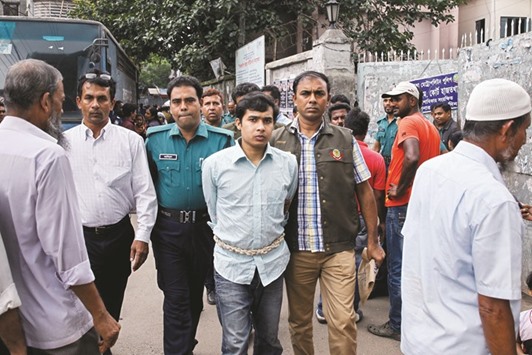Bangladesh police said yesterday they had arrested six members of banned Islamist groups blamed for a series of deadly attacks, including the main suspect in the gruesome killing of a secular publisher.
Moinul Islam Shamim was arrested on Tuesday night just outside the capital Dhaka for allegedly leading the fatal hacking attack on publisher Faisal Arefin Dipan in his office last year.
“Shamim is the main accused in the Dipan murder. Police had announced a reward for any information leading to his arrest,” deputy commissioner of Dhaka police Masruk Khaled said.
Shamim “admitted during interrogation” to his involvement in the October murder of Dipan who was a known publisher of books in Bangladesh by secular and atheist writers, Khaled said.
Shamim is a suspected member of homegrown extremist group Ansarullah Bangla Team, which swears allegiance to a local branch of Al Qaeda and has claimed responsibility for similar murders of about a dozen secular activists.
The elite Rapid Action Battalion also stormed two hideouts on Dhaka’s outskirts and arrested five suspected members of banned outfit Jamayetul Mujahideen Bangladesh (JMB), including one of its leaders who used to study in Canada.
“They include Rasheduzzaman who took over as the JMB’s regional chief recently. He studied in a Canadian university between 2006-2012,” RAB spokesman Mufti Mahmud Khan said of those arrested.
The government has blamed the JMB for the July 1 attack on an upmarket cafe in Dhaka in which 20 hostages, including 18 foreigners, were killed along with two policemen.
Police have said Tamim Chowdhury, another senior JMB figure and a Canadian citizen of Bangladesh origin, masterminded the siege and a deadly attack on Bangladesh’s largest Eid congregation a few days later. A reward has been offered for his capture.
Khan, however, could not say whether Rasheduzzaman was a Canadian citizen.
The Islamic State group claimed responsibility for the siege, releasing photos from inside the cafe during the attack and of the five men who carried out the deadly assault and were shot dead at its finale.
Authorities have rejected the claim, saying international jihadist networks have no presence in the nation.
Bangladesh has been reeling from a deadly wave of attacks in the last three years, including on foreigners, rights activists and members of religious minorities.
Critics say Prime Minister Sheikh Hasina’s administration is in denial about the nature of the threat posed by extremists, and accuse her of trying to exploit the attacks to demonise her domestic opponents.

Bangladeshi security personnel escort Sifat (centre), who also goes by the aliases Shamim and Moinul Islam towards a court in Dhaka yesterday.
